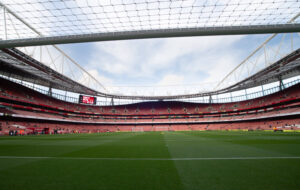As late as 1971, the Danish Football Federation allowed professional players to represent the national team. Before that, it was exclusively for amateur footballers. Despite this, Denmark achieved surprising success in international tournaments. They won Olympic gold in 1906, silver in 1908, 1912 and 1960, bronze in 1948, as well as a fourth-place finish at the 1964 Euros. But they had never played in a World Cup at this point and the reason they did well in the 1964 Euros was that only four teams participated, and they just had to beat Albania and Luxembourg to qualify. The rise of the Denmark national team is truly underrated.
The Rise of the Denmark National Team
Amateur Origins
The amateurism of the Denmark national team was clearly visible during qualification for the 1966 World Cup, where they finished bottom of their group behind the Soviet Union, Wales and Greece. It also wasn’t much better in qualification for the 1970 edition, where they finished third behind Hungary and Czechoslovakia. The Danish national team was in serious jeopardy and radical changes were needed.
Essential Changes
In 1971 these changes came in the form of allowing professional players to represent the national team. For the first few years, this didn’t really improve their fortunes whatsoever. They continued to fail in qualification for international tournaments. The first major breakthrough came in 1979 when they signed a sponsorship deal with Carlsberg, which subsequently gave the Danish Football Federation the money necessary to hire a talented full-time coach – Sepp Piontek. The transition from amateurism to professionalism had been completed. But their World Cup debut would have to wait, because in qualification for the 1982 World Cup, Denmark finished third in their group, behind Yugoslavia and Italy. However, it’s worth pointing out they managed to beat Italy during qualification, so improvements had been made.
Euro 1984 Success
Instead, they set their eyes on the 1984 Euros and playing in a major tournament for the first time in 20 years. Their qualification group was competitive with the likes of Greece, Hungary and, especially, England. Denmark started their campaign impressively, securing a 2-2 draw at home against England. But their true crowning moment came one year later at Wembley when they recorded an astounding win that secured their place at UEFA Euro 1984. The rise of the Denmark national team was now undeniable.
Denmark’s opening game was against hosts France, who had Michel Platini in his prime. He proved to be the difference between the two nations, as he scored the only goal of that game in the 78th minute. All hope was far from lost, but it was still incredibly demoralizing for the Danes since they had fought hard and arguably deserved a point.
Denmark found redemption in their second game, obliterating Yugoslavia 5-0.
However, 39 minutes into their final group game against Belgium, advancing to the knockout phase seemed like an impossible dream, as they were 2-0 down. But after converting a penalty in the 41st minute, they only needed two more goals to advance. One of those goals came in the 60th minute from Anderlecht striker Brylle Larsen, and the second came in the 84th minute when Lokeren striker Preben Elkjaer stunned the Belgian defence with a remarkable individual performance. Ironic as it was, Belgium had been eliminated after three goals from players in the Belgian league.
In the semi-finals, Spain awaited them. Denmark continued to shock the footballing world when they obtained a lead in the seventh minute after a goal fröm Sören Lerby. But exactly 60 minutes laters Antonio Maceda broke Danish hearts when he equalized for Spain. Denmark lost the subsequent penalty shoot-out – their journey had reached a heartbreaking end.
Sensational World Cup Debut
Despite this, they kept their heads up high. They had reached a level they didn’t think was possible. They had their eyes set on making their World Cup debut. Denmark were arguably in the most difficult qualification group, but that didn’t stop them from winning it and securing a spot at their first-ever World Cup. After six failed attempts, Denmark finally qualified.
In their opening game, Denmark recorded a solid 1-0 win against a Scotland side coached by Sir Alex Ferguson. Their next opponents were reigning Copa America champions Uruguay, and the Danish coach Sepp Piontek had expressed he thought they were the best team in the group – a group which also featured West Germany. No one could’ve possibly seen what was next.
Preben Elkjaer gave Denmark the lead in the 11th minute and Sören Lerby doubled it half an hour later. Francescoli then converted a penalty for Uruguay right on the stroke of half-time. Uruguay were favourites, but Denmark had shown they were contenders during qualification. However, it’s what happened during the second half that would make this game go down in history as more than just a minor upset.
Four goals in 36 minutes, two of which were scored by Elkjaer, made him the first-ever Danish player to score a hat-trick at a World Cup. The result sent shockwaves through the footballing world. Little Denmark were now considered actual contenders for the World Cup title by many.
Heartbreaking World Cup Exit
The build-up for their final group game against West Germany was weird, to put it simply. Some people argued it would be better to lose since the loser of the game would play against Morocco in the round of 16, whereas the winner played against Spain – a much tougher opponent according to most people. The managers of Denmark and West Germany respectively both expressed they would do everything to win the game. When all was said and done, Denmark had won 2-0 and were going to play against Spain in their first knockout game.
Denmark had been so convincing in the tournament that they were considered favourites by many, even against mighty Spain. In the 33rd minute, Denmark were awarded a penalty which was converted by Jesper Olsen and they were well on their way to the quarter-finals. Then something went horribly wrong.
Denmark became a victim of the same thing Uruguay became a victim of in their game against them. They were utterly destroyed 5-1. Sent home with immeasurable disappointment.
Unlikely Euro Qualifying
The disappointments kept coming because at the 1988 Euros Denmark, lost every game and were eliminated in the group stage. And they failed to qualify for the 1990 World Cup after losing to Romania and dropping points against Greece and Bulgaria. Denmark were a far cry of their former selves.
In qualification for Euro 1992, only minor improvements were made. They still lost to Yugoslavia and dropped points against Northern Ireland. Once again ,they had failed to qualify for an international tournament. On May 30th, 1992, after the breakout of civil war, Yugoslavia were expelled from the Euros by FIFA and UEFA, and Denmark were awarded their spot. The decision was final and Denmark only had a few days to prepare.
Euro 1992 Group Stage
Denmark started off with an uneventful 0-0 draw against England followed by a 1-0 loss against hosts Sweden. This put them up to the unenviable task of needing to defeat France in order to advance to the semi-finals. Henrik Larsen gave the Danish an early lead in the eighth minute, but 15 minutes into the second half the superstar Jean-Pierre Papin equalized for France.
If this result stood, Denmark would be eliminated, once again falling short in an international tournament. Lars Elstrup would make sure that wasn’t the case, though, and he gave Denmark their lead back in the 78th minute.
Semi-Final Against Dazzling Dutch
Reigning European champions the Netherlands were their first knockout phase opponents – a side that boasted the likes of Ruud Gullit, Dennis Bergkamp and Frank Rijkaard. However, Larsen once again opened the scoring for Denmark. Bergkamp equalised a few minutes later, but Larsen wasn’t finished as he scored again in the 33rd minute.
After an eventful first half, Denmark led 2-1 and were heading towards the final, until the 86th minute when Frank Rijkaard equalized. In 1984, Denmark were eliminated after losing a penalty shoot-out. But this time, largely due to the heroics of Peter Schmeichel, they made sure that wouldn’t be the case. Denmark rejoiced as they played in their first-ever final, excluding the Olympics.
Champions Against All Odds
In the final, reigning World Champions Germany awaited them. John Jensen gave Denmark the lead early on after only 18 minutes. Germany dominated possession for the majority of the game, but the Danes defended heroically, the saves of Peter Schmeichel being especially noteworthy. In the 78th minute, arguably against the run of play, Kim Vilfort doubled Denmark’s lead and made sure they were victorious.
A mere 21 years after first allowing professional players to represent the national team, Denmark had won a major tournament. In an unbelievably short amount of time, the Denmark national team went from amateurs to champions of Europe.
Main Photo






